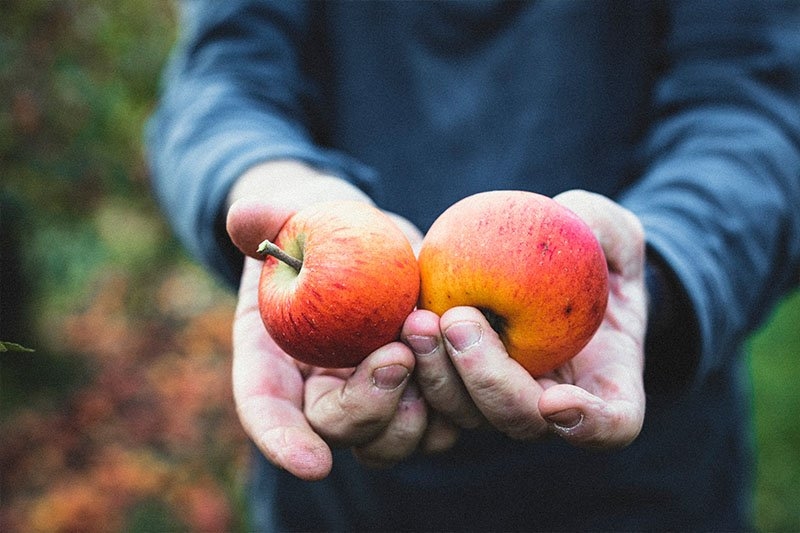In the early 1990s, Paul Ward and his wife Sara bought a house which included 4.5 acres of mature but neglected Conference pears. This small hobby farm was the start of a fruitful growing career; given a little care, the pears started to flourish, and the farming bug bit. At the time, Paul was running a construction business – but he left that behind, followed his newfound passion, and moved into fruit farming full time.
Mole End Farm is situated across the High and Low Wealds in Kent, designated areas of outstanding beauty just south of Tunbridge Wells, with lovely rolling hills and flat valleys that are perfect for growing apples. Paul and Sara converted the farm to organic in 1999, increasingly concerned about the use of broad-spectrum artificial pesticides in conventional farming:
“It seemed like a natural progression to grow things in a kinder way,” Paul says.

Despite the relatively late start to farming, which so many are born into, Paul has become a real expert; his organic apples were the first to ever win the prestigious ‘Tastiest Apple’ award at the National Fruit Show. He’s committed to proving that the results of organic farming can be just as good (and better!) than conventionally farmed fruit.
Paul and Sara have now expanded onto five sites and 100 acres across Kent. Experimenting and expanding from that first small crop of Conference pears, they grow three pear varieties (Conference, Comice and Sweet William) and 17 varieties of apples, including Crimson Crisp, Cox Royale, Gala and Red Pippin.
Once the apples are picked, they are stored in special low oxygen stores at low temperatures, which essentially sends them to sleep. Depending on the variety, they can be kept there for several weeks before coming out in just as crunchy and fresh as they went in. Paul’s well-insulated stores are mainly powered by solar panels, using very little energy.
Earlier varieties, like Discovery, Windsor, and Scrumptious, don’t store as well so they tend to be picked, chilled and sent straight out for delivery. Later varieties, such as the sturdy Cox or Cox Royale, can be stored for much longer without losing quality.
One of the biggest difficulties with growing organic apples and pears is keeping on top of fungal pathogens, which live naturally on leaves and can cause dark marks on the skin of apples. Paul monitors the spores of these pathogens with computer systems and weather stations inside the orchards. If there’s a high risk, he might spray the leaves with a benign biological control, like bicarbonate of soda, also known as baking powder!
“It actually says food grade on the back, and it’s a big part of our armoury,” he explains. “We also use seaweed, which is mixed in tanks and sprayed onto leaves, because it’s a great biostimulant and makes the plant stronger and with better quality leaves.”
While his day is usually spent overseeing the team in the packhouse – Mole End Farm now employs around 20-25 people – and walking the crops, Paul also has a passion for seeking out the best new varieties, such as Crimson Crisp, which is now a favourite seasonal addition to the Riverford boxes.
“Crimson Crisp is amazing,” says Paul. “It’s a really nice sugar-acid balance, with a beautiful, dark flesh. It is crimson on one side and yellow on the other.”
“Eating the first Discovery of the year is probably the best moment for me. It can be any time from the beginning of August to the end of September, depending on how much sunlight we get and the general climate,” he says.





